Being the richest person in the world certainly does not guarantee being the most informed. Consider Jeff Bezos.
The Amazon tycoon has big plans for space. (Having a net worth of $150 billion might tend to make people think big.) He envisions a future in which a "trillion" (yes, a trillion!) people live in giant, rotating spaceships like that one from the movie Passengers.
Thoughtful people might have some minor quibbles. For instance, why do we need to make room for a trillion human beings? And why do we need to leave Earth? The Economist, which seemed skeptical, explained Mr. Bezos' thinking:
"Mr Bezos’s ultimate justification for pursuing such megaprojects is his worry about the mismatch between the exponential process of population growth and the finiteness of Earth’s resources."
But this reasoning is fatally flawed. Human beings aren't bacteria or cockroaches. We do not reproduce exponentially.
 In fact, the entire concept of "overpopulation" is a complete myth. At some point, probably in the 22nd Century, the human population will peak (perhaps at 11 or 12 billion) and then decline thereafter. (See graph. Source: United Nations.)
In fact, the entire concept of "overpopulation" is a complete myth. At some point, probably in the 22nd Century, the human population will peak (perhaps at 11 or 12 billion) and then decline thereafter. (See graph. Source: United Nations.)
Some think it will happen sooner. Authors Darrell Bricker and John Ibbitson argue that the human population will peak at 9 billion this century, after which society will face enormous challenges due to depopulation. The point is that no one who has seriously studied the issue believes we need to build a home for a trillion people.
Mr. Bezos' argument that Earth has finite resources is absolutely true. But we have been doing more with less, a process known as dematerialization. We're finding newer, sustainable ways to make things like plastic. Stuff that cannot be synthesized or substituted, like rare earth metals, can be recycled.
The Economist continues:
He gave the example of energy demand, which, he says, has historically grown by around 3% a year. He argues that if this were to continue, Earth would, in a couple of centuries, need to be covered completely by solar panels.
Why would Mr. Bezos presuppose that energy demand, like population growth, will continue growing forever and ever? We are purposefully creating buildings and other gadgets to be energy efficient. As we get better at building such things, we would predict that energy demand will decrease (or at least not continue growing at the same rate in the future).
And why would we meet the growing energy demand with terribly inefficient solar panels when we have better options, like nuclear power? That makes no sense at all. Besides, if humanity is ever capable of building gigantic, spinning space habitats for a trillion people, surely we'll have figured out fusion power by then.
Elon Musk, another billionaire who is not too shy to share an opinion, remarked that Mr. Bezos' plan made "no sense" because it "[w]ould be like trying to build the USA in the middle of the Atlantic Ocean."
He's right. Get comfortable. You and your (great) grandchildren will be here for a while.




